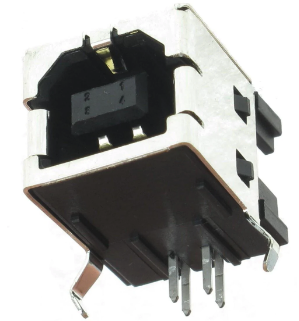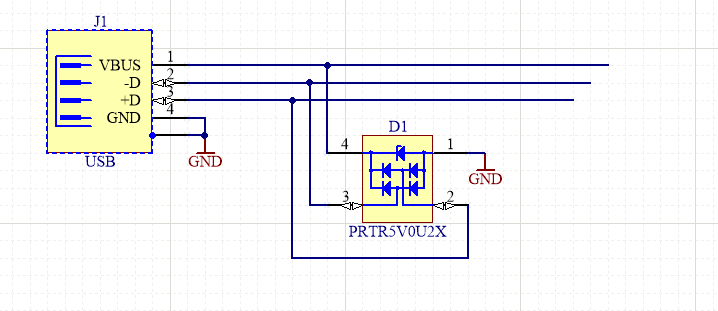USB Design Guide
USB design guide microstrip differential single-ended ESD
Key features
- USB connector
- ESD protection
- Differential microstrip design for USB
USB Connector
For this particular design I have chosen a USB-B female connector from Mouser.
| Mouser # | Manufacturer # | Manufacturer |
|---|---|---|
| 571-292304-1 | 292304-1 | TE Connectivity |

The USB connector datasheet can be found here.
ESD Protection
The PRTR5V0U4Y is designed to protect Input/Output (I/O) ports that are sensitive to capacitive load, such as USB 2.0, Ethernet and DVI from destruction by ElectroStaticDischarge (ESD). It provides protection to downstream signal and supply components from ESD voltages as high as ±8 kV (contact discharge).The PRTR5V0U4Y incorporates four pairs of ultra-low capacitance rail-to-rail diodes plus a Zener diode. The rail-to-rail diodes are connected to the Zener diode which allows ESD protection to be independent of supply voltage. The PRTR5V0U4Y is fabricated using thin film-on-silicon technology integrating four ultra-low capacitance rail-to-rail ESD protection diodes in a miniature 6-lead SOT363 package.

Microstrip Design
USB Design requires 45 Ohm single ended traces with a differential impedance of 90 Ohm. I like to use the calculators from www.mantaro.com to design microstrip lines. The differential microstrip calculator can be found here. The table below shows some initial design parameters to start the design.
| Parameter | Value |
|---|---|
| Trace Width (mm) | 0.59 |
| Trace Seperation (mm) | 1 |
| Trace Thickness (mm) | 0.035 |
| Dielectric Thickness (mm) | 0.3 |
| Relative Dielectric Constant | 4.5 |
| Differential Line Impedance | 88.678 |
| Single Ended Line Impedance | 45.228 |
comments powered by Disqus